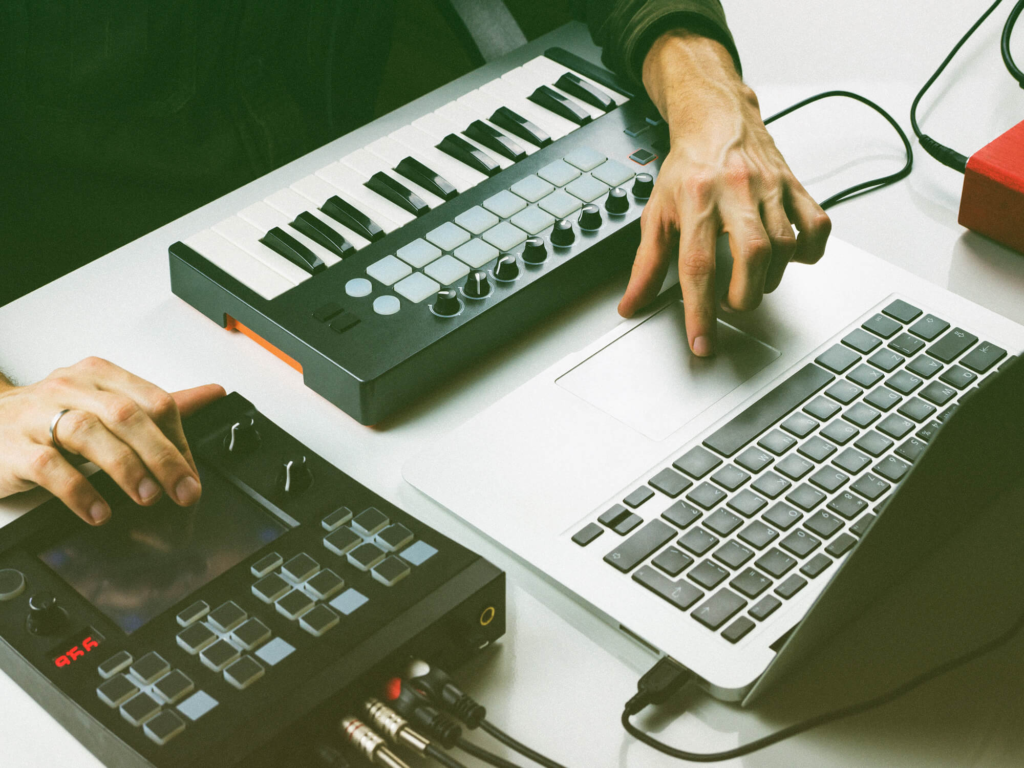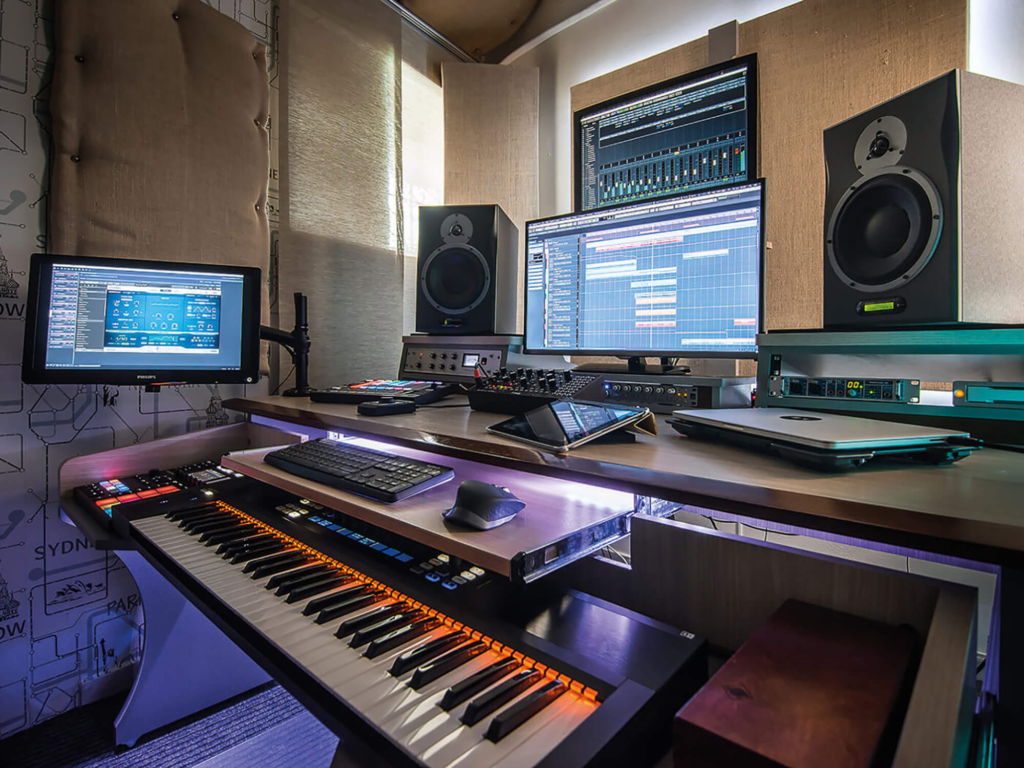
Introduction to AI in Music Production
The world of music production is evolving at a breathtaking pace, driven by the power of artificial intelligence. Gone are the days when creating a hit song required hours of meticulous work and extensive expertise. Today, AI music tools are revolutionizing how artists compose, mix, and produce their tracks. Whether you’re a seasoned musician or an aspiring creator, these advanced technologies can enhance your workflow and spark fresh ideas.
Imagine having virtual instruments that learn from your style or composition software that assists you in crafting melodies effortlessly. With machine learning algorithms analyzing trends and patterns in sound design, we’re entering an era where innovation meets creativity like never before. This comprehensive guide will explore some of the top AI tools reshaping music production today—tools designed to empower musicians while simplifying complex processes.
Join us on this journey through cutting-edge technology as we uncover how you can harness the potential of AI-generated music to elevate your artistry!
Benefits of Using AI Tools for Music Production
AI tools bring a fresh perspective to music production. They streamline the creative process, allowing artists to focus on their vision rather than getting bogged down in technical tasks.
With AI-powered composition software, musicians can generate ideas quickly. This means more time for refining and experimenting with sounds. Imagine having an endless well of inspiration at your fingertips.
Machine learning algorithms analyze vast amounts of audio data. This analysis helps producers make informed decisions about sound design and arrangement. It’s like having a knowledgeable assistant guiding you through complex choices.
AI also enhances collaboration among artists across distances. Real-time collaboration tools enable seamless interaction, making it easier to work together despite physical limitations.
Additionally, these intelligent systems offer unique insights into music trends and audience preferences. By leveraging this information, creators stay ahead of the curve while crafting innovative tracks that resonate with listeners.

Top AI Tools for Music Creation and Composition
When it comes to music creation and composition, AI tools are revolutionizing the way artists work. These innovative solutions leverage machine learning algorithms to assist musicians in generating unique melodies and harmonies.
One standout option is Amper Music. It allows users to create original tracks tailored to their specifications, making it an excellent choice for content creators needing quick soundscapes. Another popular tool is AIVA (Artificial Intelligence Virtual Artist), which excels in composing orchestral pieces perfect for film scoring or video games.
For those looking for songwriting assistance, Jukedeck offers a user-friendly interface that generates lyrics alongside musical compositions. This can spark creativity when you’re facing writer’s block.
Moreover, platforms like Soundraw aim at streamlining the creative process by providing customizable templates that adapt as you modify them. With these AI music tools, composers have endless possibilities at their fingertips.
AI Tools for Mixing and Mastering
Mixing and mastering are crucial stages in music production, where the final sound is crafted to perfection. AI tools have revolutionized this process, making it more accessible and efficient.
One standout option is **iZotope Ozone**, which harnesses machine learning to assist with mastering tasks. It analyzes your track and provides tailored suggestions for EQ adjustments, compression settings, and even stereo imaging.
Another powerful tool is **LANDR**. This platform offers automated mixing and mastering services that adapt to various genres. Its user-friendly interface allows musicians at any level to achieve professional-quality results without extensive technical knowledge.
For those looking into real-time collaboration, **Auddly** integrates seamlessly with digital audio workstations (DAWs). It enhances workflow optimization by offering a smart tagging system that organizes tracks effectively during the mixing phase.
With these AI solutions, artists can focus on their creativity while technology handles complex audio processing nuances.
AI Tools for Sound Design and Sampling
AI tools have transformed sound design and sampling into an exciting frontier for creators. These innovative technologies harness the power of machine learning to generate unique sounds, offering endless possibilities.
Imagine having a virtual assistant that understands your creative vision. AI synthesizers can analyze existing music and create new sonic textures tailored to specific genres or moods.
Sampling has also evolved with artificial intelligence. Tools now allow you to manipulate audio samples in real-time, applying effects based on user input or analyzing patterns within your tracks. This level of interactivity enhances creativity while maintaining artistic authenticity.
Moreover, deep learning algorithms help streamline the process by suggesting sounds that fit seamlessly within your composition. With intuitive interfaces, even beginners can dive into complex soundscapes without feeling overwhelmed.
Creating original sounds has never been more accessible. Embrace these advancements and elevate your projects with cutting-edge resources at your fingertips.

How to Incorporate AI into Your Music Production Workflow
Integrating AI music tools into your workflow can elevate your production game. Start by identifying areas where you spend the most time, such as composition or mixing.
Use AI-generated music software to brainstorm ideas quickly. These tools can offer fresh melodies and harmonies, sparking creativity when you’re stuck.
During the mixing phase, consider employing machine learning algorithms for audio processing. They analyze tracks and suggest adjustments that enhance clarity and balance.
Don’t overlook virtual instruments powered by deep learning. They can provide unique sounds that traditional plugins might lack.
For songwriting assistance, leverage AI plugins designed to help with lyric writing or structure. This allows you to focus on melody while still developing compelling lyrics.
Collaborate in real-time using platforms equipped with AI features that streamline feedback loops among team members. Such integration fosters a more efficient creative environment without sacrificing artistic expression.
Conclusion: The Future of AI in the Music Industry

The integration of AI in music production is reshaping the landscape of creativity. As artificial intelligence continues to evolve, it opens up new avenues for musicians and producers alike. AI music tools are not just enhancing workflow but also revolutionizing how we create, mix, and master tracks.
With advancements in machine learning and neural networks, these tools are becoming increasingly sophisticated. From songwriting assistance to genre-specific audio effects, they cater to a wide range of artistic needs. The potential for real-time collaboration has never been greater, allowing creators from around the globe to work together seamlessly.
As we look ahead, it’s clear that AI will play an essential role in shaping the future soundscape. Music innovation driven by technology will push boundaries further than ever before. Embracing these changes can lead musicians towards unexplored territories in their creative processes.
There’s no denying that AI-generated music is here to stay. With each passing day, more professionals begin incorporating AI-driven solutions into their workflows. Whether you’re composing with advanced composition software or experimenting with virtual instruments like AI synthesizers, the possibilities are limitless.
As artists adapt and leverage these powerful creative tools—such as beat-making tools and audio processing systems—they’ll find themselves empowered like never before. This era marks a significant shift toward automated processes while still retaining human touch—a balance that’s crucial for authentic artistry.
The exciting journey ahead involves harnessing technology’s potential without losing sight of our unique musical identities!
For more such content, keep visiting QAWire


